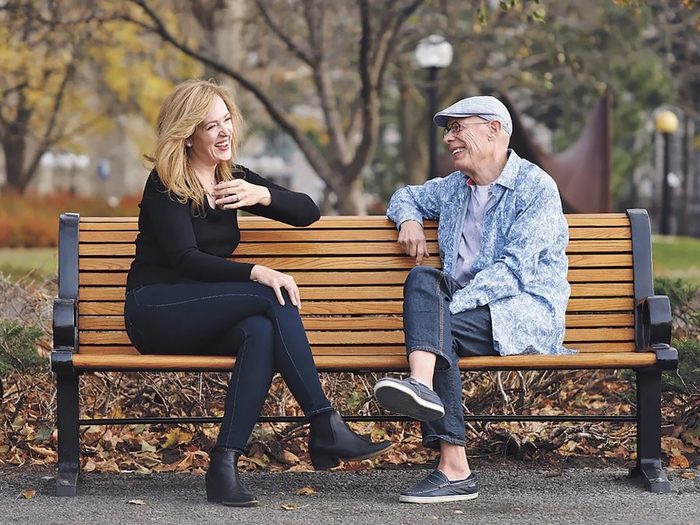How To Have A Successful Mentor Relationship

Good mentor relationships are founded on more than just sage advice. In the best mentorships, everyone has the opportunity to learn something.
My sister Miriam is the pickle lady of New Annan, N.S. On a Friday afternoon last fall, the smell of bubbling brine filled her kitchen, and clean, empty mason jars lined her counter. She was ready to host a pickle-making session for two neighbours who had always wanted to preserve vegetables but didn’t know how.
For those few hours, Miriam was a mentor to her friends, a skilled guide sharing her own knowledge to empower others a little further along on a particular journey. The trio made salsa, pickles, relish and a batch of very good memories. “The minute we stop sharing and learning from others,” says Miriam, “we stop growing.”
While mentor relationships are typically associated with office settings and career advancement, anyone could be a mentor. We can share our skills in our kitchens and backyards, over the phone or online, and within our already-established friend groups.
A mentorship can last a lifetime or it can be clearly defined in time, scope and definition, such as a few hours of intense pickling. Whatever the case may be, it’s likely we all have beneficial skills, advice and hard-earned lessons to pass on to someone else—just as we all, in turn, have a list of things we’d like to learn or areas in which we would love to grow.
If you’re ready to start a mentor relationship, here are some insights from mentors and mentees alike to help it go well right from the start.
Successful mentor relationships need ground rules
Nearly a decade ago, Patricia Paddey decided to seek out a writing mentor. Then 52, the Mississauga writer was struggling to balance her family responsibilities with her heavy workload. She’d always admired fellow author and academic Maxine Hancock and knew that, like her, Hancock had pursued graduate studies later in life. Paddey sent an inquiring email to Hancock, who, to Paddey’s surprise and delight, agreed.
Both women say that a clear set of boundaries and expectations helped seal the deal. They agreed to a monthly phone call, and Paddey sent over a simple agenda in advance of each meeting. It included a recap of their last conversation and a list of her new questions. The calls lasted for about an hour, and the mentor relationship itself began one September and ended the following April.
By the time it was over, Paddey had an arsenal of practical tips and a new outlook on how to prioritize her busy days. In the end, she says, Hancock was more of a life coach than a writing one.
To this day, Paddey has never met Hancock in person. “Because our mentorship had a firm time frame we had no problem knowing when it was completed,” says Hancock, who now lives in Vermillion, Alta. That can be more difficult, she adds, when those ground rules aren’t established. Or, as Paddey puts it: “Healthy boundaries make for healthy relationships. If you’re clear up front, there won’t be hurt feelings.”
Mentor relationships involve good listening
Mentoring is not just downloading information; it’s also creating space for the mentee to share what they need, and sometimes—especially when the mentor relationship is less about passing on a concrete skill and more about general life or career guidance—encouraging a mentee to find their own solutions.
Doug Ward, co-author of Great Mentoring for Real Life Change, says that asking good, open-ended questions lies at the heart of effective mentoring. “Questions like ‘Tell me more about that?’ and ‘What would change that?’ or even ‘What advice would you give to a friend in your situation?’ can subtly move the person forward on their journey,” says Ward.
Looking back, Hancock’s listening skills are what Paddey remembers the most about their time together, and what she intends to use in her current role as a mentor to another, younger writer. “She was a wonderful listener,” says Paddey. “She would really listen carefully to me. At no time did she make it all about herself.”
According to Ward, the art of the question is one of the best tools a mentor can develop. He suggests mentors jot down notes immediately after the meeting to help them pick up where they left off the next time, which also demonstrates attentiveness and care to the mentee. “Listening is intuitively the most important tool,” says Ward, hinting at the generosity that is built into mentor relationships. “Mentoring is not about feeding my ego. It’s about the other.”
Mentor relationships are about giving and receiving
Gordon Harrison is a well-known Canadian artist whose vibrant canvases fill a gallery on Ottawa’s Sussex drive. He is also a willing coach to artists who need a friendly ear or constructive critique. “I’m not afraid of sharing my secrets,” he says, “and giving advice and words of encouragement.”
Artist Jenn Thornhill Verma is one of the grateful recipients of Harrison’s mentoring. And while Harrison brings his expert eye and his years of experience, Verma also contributes to the working-friendship. She has, for example, helped nudge Harrison toward more social-media engagement. “A good mentoring relationship starts with a mutual interest,” says Verma, “and then it’s the genuine reciprocity of the mentor providing experience and the mentee providing new insights.”
Mentoring is ultimately about giving and receiving, says Irene Vaksman, director of Newcomer Services for JVS Toronto, a non-profit that helps new Canadians settle into life by facilitating mentor relationships between Canadians and newcomers who have similar jobs. Before Vaksman’s newcomers arrive, they can connect online with Canadians who work in their field. They can ask time-saving questions and learn insider information about what their occupations—and lives—are like in a new country.
Many people who have been mentored are often inspired to become mentors themselves as they start to settle into Canadian life. “More and more we are seeing people who were immigrants themselves seeking this opportunity to give back,” says Vaksman. Mentoring begets mentoring, and that is part of the Canadian spirit Vaksman wants all of her clients to see. “Mentoring cultivates the spirit of giving back and paying forward,” she says. “It’s a powerful tool.”
Next, read about Connected Canadians, a mentorship program that helps seniors become tech savvy.






